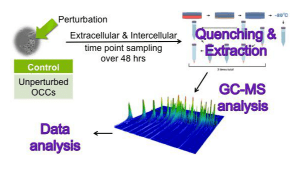
Since 1924, when Warburg discovered anaerobic glycolysis, it has been known that cancer cellular metabolism is distinct from normal cellular metabolism. It is only recently that the role metabolism plays in cancer has become generally recognized. Dysfunctional metabolism is now acknowledged as a hallmark of cancer, and further examples of altered metabolism in cancer cells have been demonstrated. However, most of cancer metabolism research to date has been done in a targeted manner, focusing only on one pathway or even one specific reaction or metabolite in a pathway rather than a broader overview of the entire system. A systems-level understanding of the dynamics of these metabolic behaviors could profoundly affect the way that cancer is understood or even treated. In order to explore the systems-level dynamics of cancer metabolism, epithelial ovarian cancer metabolism is profiled in response to perturbations in vitro. The perturbations reflect biological stresses that occur normally in cancer, such as hypoxia and nutrient fluctuations, and induced stresses, such as chemotherapy. These dynamic experiments are performed over a span of two days, with several time points taken within this span. Both extracellular and intracellular samples are taken at each time point and then processed and analyzed using two-dimensional gas chromatography coupled to mass spectrometry. The metabolic profiles generated by these experiments will allow us to determine specific metabolites and pathways that are altered by the biological perturbations, granting us further insight into cancer metabolism.
Related publications:
- OVCAR-3 spheroid-derived cells display distinct metabolic profiles
- Distinct metabolic responses of an ovarian cancer stem cell line
- Applications of Metabolomics in Cancer Research